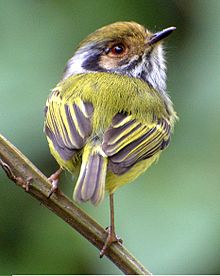
The white-eyed foliage-gleaner is a species of bird in the Furnariinae subfamily of the ovenbird family Furnariidae. It is found in Argentina, Brazil, and Paraguay.

The ochre-throated foliage-gleaner is a species of bird in the Furnariinae subfamily of the ovenbird family Furnariidae. It is found in Panama and every mainland South American country except Argentina, Chile, Paraguay, and Uruguay.
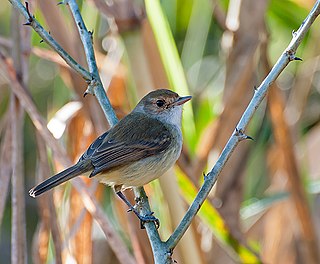
The fulvous-crowned scrub tyrant, or tawny-crowned pygmy-tyrant, is a species of bird in the family Tyrannidae, the tyrant flycatchers. It is found in Argentina, Bolivia, Brazil, Colombia, Paraguay, Peru, Uruguay, and Venezuela.

The rufous-sided scrub tyrant, or rufous-sided pygmy-tyrant, is a species of bird in the family Tyrannidae. It is found in Bolivia, Brazil, Paraguay, and Suriname.

Pelzeln's tody-tyrant is a species of bird in the family Tyrannidae, the tyrant flycatchers. It is found in Brazil, Suriname, and Venezuela.

Johannes's tody-tyrant, or Joao's tody-tyrant, is a species of bird in the family Tyrannidae, the tyrant flycatchers. It is found in Bolivia, Brazil, Colombia, Ecuador, and Peru.
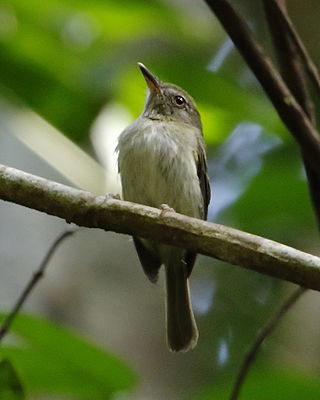
Snethlage's tody-tyrant is a species of bird in the family Tyrannidae, the tyrant flycatchers. It is found in Bolivia, Brazil, Venezuela, and possibly Peru.
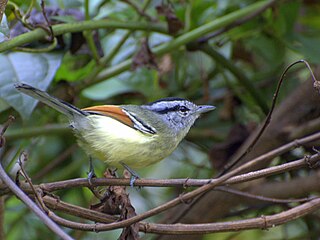
The rufous-margined antwren is an insectivorous bird in subfamily Thamnophilinae of family Thamnophilidae, the "typical antbirds." It is found in Argentina, Brazil, and Paraguay.

The spotted antpitta is a species of bird in the family Grallariidae. It is found in Brazil, Colombia, French Guiana, Guyana, Peru, Suriname, and Venezuela.

The Roraiman flycatcher is a species of bird in the family Tyrannidae, the tyrant flycatchers. It is found in Brazil, Colombia, Ecuador, Guyana, Peru, Venezuela, and possibly in Bolivia.

The white-bellied pygmy tyrant or white-breasted pygmy-tyrant is a species of bird in the family Tyrannidae, the tyrant flycatchers. It is found in Bolivia, Ecuador, and Peru.

The ornate flycatcher is a species of bird in the family Tyrannidae, the tyrant flycatchers. It is found in Colombia, Ecuador, and Peru.

The rufous-fronted thornbird, or common thornbird, is a species of bird in the family Furnariidae. It is found in Brazil, Bolivia, Argentina, Ecuador, Paraguay, and Peru.

The southern mouse-colored tyrannulet is a species of bird in subfamily Elaeniinae of family Tyrannidae, the tyrant flycatchers. It is found in Argentina, Bolivia, Brazil, Paraguay, Peru, and possibly French Guiana and Suriname.
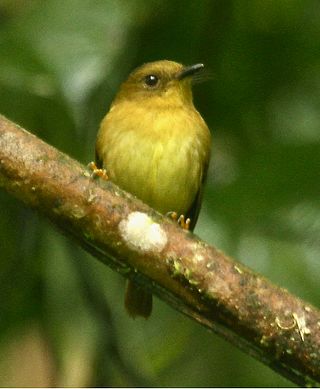
The bronze-olive pygmy tyrant is a species of bird in the family Tyrannidae, the tyrant flycatchers. It is found in Colombia, Ecuador, Panama, and Peru.

The Peruvian tyrannulet is a species of bird in the family Tyrannidae, the tyrant flycatchers. It is endemic to Peru.

The Venezuelan parakeet or Emma's conure is a species of bird in subfamily Arinae of the family Psittacidae, the African and New World parrots. It is endemic to Venezuela.

Coopmans's tyrannulet is a species of bird in the family Tyrannidae, the tyrant flycatchers. It is found in Colombia and Venezuela.

The Loja tyrannulet is a species of bird in the family Tyrannidae, the tyrant flycatchers. It is found in Ecuador and Peru.

The fulvous-faced scrub tyrant, or tawny-fronted pygmy-tyrant is a species of bird in the family Tyrannidae, the tyrant flycatchers. It is found in Ecuador, Peru, and possibly Colombia.
